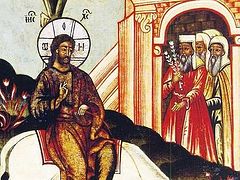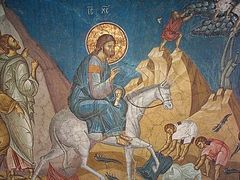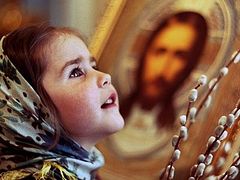Palm Sunday immediately precedes Holy Week which concludes as Pascha begins. Archpriest Vyacheslav Kharinov, rector of the Church of the icon of the Theotokos “Joy of All Who Sorrow” in St. Petersburg, reflects on the spiritual Christian meaning of these events.
“First fruits”
Why do we in Russia come to church with pussy-willow [the first tree which starts to bloom in spring in Russia.—Trans.] branches on Palm Sunday? It is generally believed that although in Jerusalem people greeted Christ with palm branches, palms don’t grow in our country, so we use pussy willows. We remember that in the Old Testament God tells people to bring their “first fruits” to the Temple as a sign that all that we have comes from God. The pussy-willow is one of the plants whose flower buds open fully in early spring.
There are numerous superstitions connected with this tree. Thus, in olden times pussy-willow infusions were given to cattle to protect them from evil and pussy-willow branches were left in cowsheds. While the Church doesn’t encourage these practices, it examines such phenomena as part of the popular piety. Nowadays many people believe that pussy-willow branches should necessarily be sprinkled with holy water. In Russia believers often keep pussy-willow branches in their “icon corners” until next year’s Palm Sunday, whereupon they can be burned. The latter generally applies to all old and decayed objects that are regarded as sacred. If someone has nowhere to burn them, they can be taken to churches where there are special ovens for this purpose.
The Entry of the Lord into Jerusalem was described in the Old Testament by Prophet Zechariah in the sixth century B.C. He wrote about a king who entered Jerusalem on a young donkey. Why a donkey and not a horse? In the East horses were considered as animals of warfare, so only a tyrant or a despot could enter a city on horseback. The donkey is a symbol of peace, and Christ is a meek King. Interestingly enough, the owners gave their donkey to the apostles without a murmur, though at the level of everyday life it is hard to imagine that a peasant could easily part with his animal. Christ could have made His main enemies—the scribes and Pharisees—speechless and non-resistant and thus protect Himself. But He didn’t do it, instead giving Himself up to voluntary suffering.
Palm Sunday is a festive occasion. Fear not, daughter of Sion: behold, thy King cometh, sitting on an ass’s colt (Jn. 12:15). It is a call to Jerusalem. In Jerusalem people met and welcomed Christ with exultant joy; they saw that the messianic prophecies were being fulfilled, since the Lord had just raised Lazarus from the dead. But their concepts of the Messiah were different. Many mistakenly took the Savior for a powerful king and expected Him to lead a rebellion and do away with the rule of the Roman invaders. The Pharisees and scribes began to manipulate the crowd—all of Holy Week demonstrates the crowd’s inconstancy for all times. In a matter of a few days the cries of “Hosanna!” changed to the cries “Crucify Him!”
Everyone is invited to the feast
Many of those who didn’t fast during Lent are minded to do this “disciplinary exercise” in Holy Week, though they fear that it may be too late. But in Christianity it can never be too late, as the Lord always gives us a chance for salvation, even at the last minute. St. John Chrysostom in his Paschal Sermon mentions those who came to the feast at the third, sixth, ninth, and even eleventh hours. The master finds an excuse for the late arrival of each of them and seats them around the table because this feast is for everyone. If we apply the human yardstick to those who came late, they do not deserve to be admitted to the feast—but the mercy of God is different.
Among other things, a fasting period helps us realize how much has been given us in this life: when the time of voluntary abstinence is over, we see how much joy we derive even from everyday things.
On each day of Holy Week we remember the final days of Jesus Christ’s life on earth and His Passion. It would be advisable to confess and take Communion on Holy Thursday because on this day the Divine Liturgy in commemoration of the Last Supper is celebrated. Starting from Friday evening you can bake Paschal cakes and dye Easter eggs.





